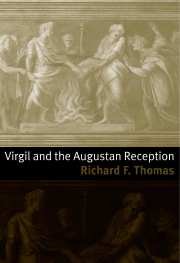Book contents
- Frontmatter
- Contents
- Acknowledgements
- Prologue
- Introduction: the critical landscape
- 1 Virgil and Augustus
- 2 Virgil and the poets: Horace, Ovid and Lucan
- 3 Other voices in Servius: schooldust of the ages
- 4 Dryden's Virgil and the politics of translation
- 5 Dido and her translators
- 6 Philology and textual cleansing
- 7 Virgil in a cold climate: fascist reception
- 8 Beyond the borders of Eboli: anti-fascist reception
- 9 Critical end games
- Bibliography
- Index
8 - Beyond the borders of Eboli: anti-fascist reception
Published online by Cambridge University Press: 07 December 2009
- Frontmatter
- Contents
- Acknowledgements
- Prologue
- Introduction: the critical landscape
- 1 Virgil and Augustus
- 2 Virgil and the poets: Horace, Ovid and Lucan
- 3 Other voices in Servius: schooldust of the ages
- 4 Dryden's Virgil and the politics of translation
- 5 Dido and her translators
- 6 Philology and textual cleansing
- 7 Virgil in a cold climate: fascist reception
- 8 Beyond the borders of Eboli: anti-fascist reception
- 9 Critical end games
- Bibliography
- Index
Summary
Virgil, who was so often able to express his horror of war, would today be silenced in a concentration camp.
THEODOR HAECKER, Journal in the Night, 19 May 1940Don't follow leaders …
BOB DYLAN, “Subterranean Homesick Blues”In the middle of the twentieth century, as perhaps in its later reaches, when many readers of Virgil became alienated from the authority of the state, they seemed to acquire the ability to read Virgil with an eye to oppositional possibilities. They did not necessarily reject him as a representative of that authority, as some like Auden and Graves did, but rather they gained access to, and exploited in their own thinking and writing, the ways in which the Augustan Virgil is an appropriation, not always coincident with the Virgil of their own experience. I here offer some case studies of such readings, all through the lense of the dispossessed of Europe, for whom, as for Meliboeus, Orpheus or Turnus, there was no place in the New Order.
Vienna to New York
Within his general appreciation of Hermann Broch's The Death of Virgil and of its place in the modernist reception of Virgil, T. Ziolkowski has convincingly demonstrated Broch's general unfamiliarity with classical philology, Latin, and Virgilian scholarship. With that no critic can easily disagree, but does it necessarily lead to the conclusion that when Broch “attributed Virgil's decision to burn the Aeneid to metaphysical doubts involving the crisis of values and the illegitimacy of art, he is projecting onto an ancient author modern anxieties that have no basis in history or the extant texts”? Are we any more justified in insisting that Virgil's motivations could only have to do with the poem's lack of finish, as some ancient texts assert?
- Type
- Chapter
- Information
- Virgil and the Augustan Reception , pp. 260 - 277Publisher: Cambridge University PressPrint publication year: 2001
- 2
- Cited by

